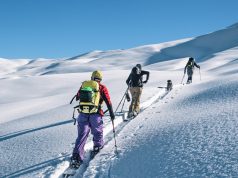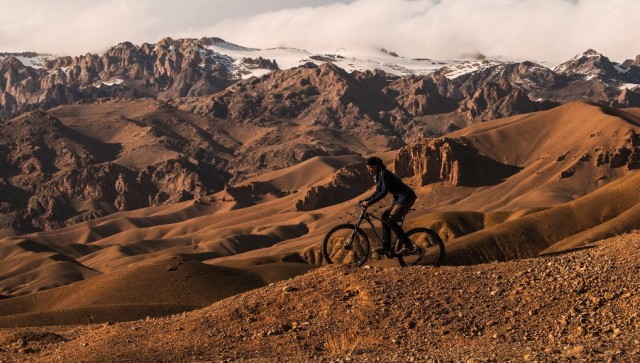
In America, a woman on a bike is not a novel sight. But in Afghanistan, a woman on a bike starts a conversation. The country has had a long, sorted history of restricting women’s rights, and while the country made big strides recently, the bike is still a mountain waiting to be conquered.
“I was curious that in a country where women were running for parliament, becoming doctors, joining the police forces as well as the army, that bikes were still that last hold out. Women were going to driving school and learning to drive cars, but they can’t ride a bike,” says Shannon Galpin, founder of the nonprofit organization Mountain2Mountain.
In 2007, Galpin founded the organization with a goal of focusing on advancing women’s rights in conflict zones. Although she had no previous experience running a nonprofit, she had spent years as a sports trainer in Europe running her own business. She knew she wanted to do whatever she could to help women in tough areas, but first she knew she needed to learn more.
“Because [Afghanistan] was a country repeatedly ranked the worst country in the world to be woman, I wanted to understand what the reality was, and also what was the gray scale of that reality,” she says. “It’s not that every women is oppressed and a modern day slave and the property of man.”
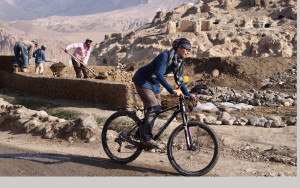
Baffled by the thought of women not riding bikes, Galpin started there. In 2008, she left her home in Breckenridge, Colorado, and took her mountain bike to the terrain of Afghanistan.
“They found me a curiosity,” she says. “I always joke that I was like a circus bear juggling on a unicycle, because I was a spectacle. But it became an icebreaker … as a means to explore the barrier and to also challenge it and show that women can ride. It’s just a matter of acceptance and accessibility.”
Over the past several years, Galpin has visited Afghanistan multiple times, helping to improve education by providing computer labs, building a school for the deaf and developing programs for incarcerated women.
Through her work she realized the importance of voice. In 2014, she wrote Mountain to Mountain: A Journey of Adventure and Activism for the Women of Afghanistan detailing her personal journey. As a foreign woman in the country, Galpin says she was treated as an “honorary man.” This gave her unprecedented access to both men and women and an ability to hear various perspectives from both sides. She encouraged people to tell their own stories and wanted to start a dialogue.
Along the way, she heard various women’s stories of abuse and violence.
“I had a lot of curiosity around gender violence and questions as to why we don’t look at the women who are victimized as catalysts for change?” she asks. “Why are we always looking at areas like Afghanistan and the women within Afghanistan as ‘victims?’ And we do the same thing in the U.S. We look at them as ‘victims,’ of gender violence or human trafficking, and therefore we negate their voice.”
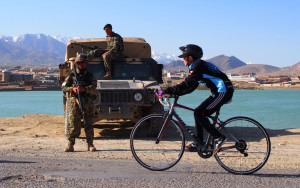
The cause hits home to Galpin and her family. When she was 18 years old, Galpin was raped and beaten. Several years later, her younger sister had a similar experience, and it shook Galpin’s own memory.
“It was an immediate switch of recognizing that I had never acknowledged my own rape, and that it was way too prevalent,” she says. “Essentially, I looked at my sister and thought what are the odds that my parents would have two girls 10 years apart, and it happens to both of them in different states in, supposedly, a very safe country. And here I was bringing a daughter into the world.”
Unfortunately, those odds are very high, and even higher in Afghanistan, which is why Galpin chose to help. She wanted to shred the labels and rise above societal limitations. Her own background allowed her to start talking and make things happen.
“I might be a white girl from North Dakota living in Colorado, but for me personally, my intimacy of knowledge [of gender violence] has become a way to connect with other women and a way to look at these issues without the framework of ‘these poor women.’ Instead to look at it as, what do we need to do to plug in these women as leaders in their community? What tools do they need?”
She realized two methods for progress were art and sport. Galpin worked with graffiti artists, photographers and more to stage exhibits like Streets of Afghanistan in 2012. This life-size photo project helped bridge cultural gaps and bring exposure to the realities of everyday life in Afghanistan.
But a lot of Galpin’s work came back to the bicycle: an easy, cheap and available tool that packed a heavy punch when breaking societal norms.
“When you ride a bike you feel strong and you feel free — all those things resonate to fighting back, to using your voice, to not accepting things as a ‘victim’ would,” she says.
Initially, when the female bike riders are introduced, almost every culture resists the shift. For example, in 1800s America, Galpin says, women riders were called promiscuous and immoral. But while the beginning may be rocky, the end results are remarkable. Galpin cites Cambodia, where women were given bikes to travel to school.
Education was the first benefit, but access to bikes also lowered instances of gender violence, especially in rural areas, greatly reducing crimes of opportunity and making women harder targets.
Of course, Afghanistan is still in the early stages. Even if Galpin found supporters of her personal bike riding, they drew the line at their own family members.
“A girl’s worth is linked to her ability to be married, and if she’s seen as dishonorable she can’t get married,” Galpin says. “There’s also the worry that the bike will take your virginity, which is also one of the only keys of value. There are a lot of stigmas attached in very real, concrete ways. As well as just the fact that you’re viewed as a bad girl.”
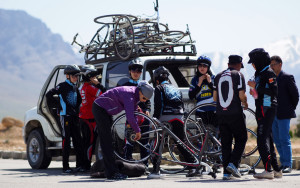
Thankfully, the situation is improving. In 2012, Galpin ran into Abdul Sadiqi, the coach of Afghanistan’s men’s and women’s cycling team — he started the men’s team before the rise of the Taliban and the women’s just a few years ago. Sadiqi wanted to bring cycling to Afghanistan as a new sport that could build easily in the country.
With the women’s team, Sadiqi single-handedly started from scratch, with many girls who didn’t know how to ride. From their first meeting on, Galpin has worked with both teams on her various visits. She has also helped to replace their outdated, rusted equipment with over 500 pounds of cycling gear for both teams, including more than 60 new racing and mountain bikes. This has allowed the teams to train better and accept invitations to race in other countries.
If female bike riding is to be normalized in Afghanistan, Galpin knows local women need to ride and be seen by their fellow citizens. This recognition is an important factor for the women on the team and their families.
“The girls all have families that support them. The coach was very direct with the team, ‘If your family doesn’t support this then you can’t ride,’” she says. “But he’ll go with them to talk with the fathers and the mothers. … [These families] have also supported their education. They may not be well off girls, many are very poor, but the families value education. And they’ve been supportive of the girls doing new things and exploring the opportunities presented to them in this post-Taliban era.”
Galpin says being on the team has strengthened the women’s confidence, and the team’s visibility has also increased worldwide. Last year, they were chosen among National Geographic’s Adventurers of the Year, an honor that Galpin earned in 2013. The girls are also attached to a Nobel Peace Prize recommendation this year for the bicycle as a vehicle for social change.
The future for the Afghan women’s cycling team and Mountain2Mountain looks bright. It includes Afghan Cycles, a documentary produced by Galpin and an all-female crew that’s planned to hit the film festival circuit this spring. Galpin also hopes to bring some of the Afghan riders to Colorado in the summer to train and attend some screenings.
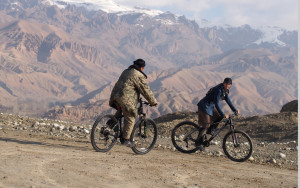
Their success is a great accomplishment, but the end goal is bigger.
“They are kind of the 1 percent. There are a hundred girls, maybe, who ride bikes in the entire country of Afghanistan. It’s not yet acceptable,” Galpin says. “But every time they ride, they ride knowing that others see them. It challenges the perception.”
The conversation has started, and it’s catching fire. And while there are systemic problems and generational shifts that need to be addressed, Galpin says it all starts with the individual.
“I remember after one ride,” she says, “one little boy came up to me and said, ‘I didn’t know that girls could ride bikes. I’m going to go teach my sister!’ And that’s exactly what you want to see.”




